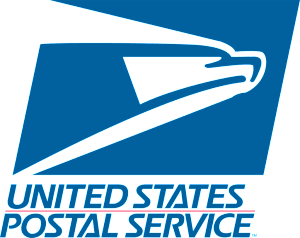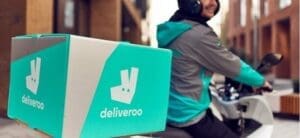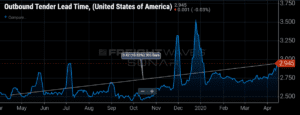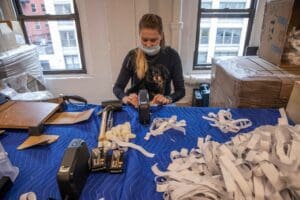 This past Monday was Patriots Day, which in Boston is one of the best sports days of the year. But, due to coronavirus, the Boston Marathon has been pushed off until September (hopefully) and the Red Sox season is on hold. Usually, millions of spectators flock to the historic marathon route to cheer on the word’s best as well as weekend warriors as they push their bodies to the limits with the hope of making that final turn from Hereford to Boylston to cross the finish line. To add to the sad Boston sports news, the Patriots traded the newly unretired Rob Gronkowski to the Tampa Bay Buccaneers to join forces with Tom Brady again. We all knew this was a possibility, as Gronk shut down a trade to the Lions two years ago saying he would only play with Brady. Once Brady signed with the Bucs, the rumors began that Gronk was ready to return. It will be interesting to see if he signs an extension, as the Pats and Bucs are slated to play each other in 2021. And now on to this week’s logistics news.
This past Monday was Patriots Day, which in Boston is one of the best sports days of the year. But, due to coronavirus, the Boston Marathon has been pushed off until September (hopefully) and the Red Sox season is on hold. Usually, millions of spectators flock to the historic marathon route to cheer on the word’s best as well as weekend warriors as they push their bodies to the limits with the hope of making that final turn from Hereford to Boylston to cross the finish line. To add to the sad Boston sports news, the Patriots traded the newly unretired Rob Gronkowski to the Tampa Bay Buccaneers to join forces with Tom Brady again. We all knew this was a possibility, as Gronk shut down a trade to the Lions two years ago saying he would only play with Brady. Once Brady signed with the Bucs, the rumors began that Gronk was ready to return. It will be interesting to see if he signs an extension, as the Pats and Bucs are slated to play each other in 2021. And now on to this week’s logistics news.
- USPS halting international services in 72 countries
- Chinese driverless car firm launches autonomous deliveries in California
- UK could run out of warehouse space in two weeks as imports pile up
- Amazon wins fresh chance at more food delivery
- Increasing lead times could be the new “Amazon effect”
- Manhattan loft reinvents itself as PPE factory
- ABQ manufacturer begins distributing a vital product: toilet paper
- Small fleets struggle as freight levels continue nosedive
 The US Postal Service (USPS) has increased the number of foreign markets that it will not be delivering to, reaching 72 total countries last week. The root cause for the disruption is the coronavirus pandemic, but there are possibly other underlying issues. Some of these include relationships with postal services in these countries, uncertainty over the safety of making deliveries, higher shipping prices into these countries, or simply the uncertainty of the USPS’ future. This is putting added strain on US businesses that rely on the Postal Service for delivery in foreign markets, especially as capacity tightens for alternative options. The recent additions include India, Saudi Arabia, and South Africa.
The US Postal Service (USPS) has increased the number of foreign markets that it will not be delivering to, reaching 72 total countries last week. The root cause for the disruption is the coronavirus pandemic, but there are possibly other underlying issues. Some of these include relationships with postal services in these countries, uncertainty over the safety of making deliveries, higher shipping prices into these countries, or simply the uncertainty of the USPS’ future. This is putting added strain on US businesses that rely on the Postal Service for delivery in foreign markets, especially as capacity tightens for alternative options. The recent additions include India, Saudi Arabia, and South Africa.
 As people remain home due to coronavirus, more companies are looking at delivery options. Chinese driverless car start-up Pony.ai has launched a home delivery service in Irvine, CA using its autonomous vehicles. The company had, until recently, been running a robo-taxi service in Irvine, partnering with Hyundai. However, with the shelter in place order in effect in Northern California, the service was suspended. Pony.ai has now repurposed its 10-vehicle fleet for home deliveries in a partnership with Yamibuy, an Asian-centric international e-commerce corporation. The autonomous car will deliver the package to a customer, who can either pick it up or have an operator leave it at the door. A Pony.ai spokesperson said the company can deliver somewhere between 500 to 700 packages a day.
As people remain home due to coronavirus, more companies are looking at delivery options. Chinese driverless car start-up Pony.ai has launched a home delivery service in Irvine, CA using its autonomous vehicles. The company had, until recently, been running a robo-taxi service in Irvine, partnering with Hyundai. However, with the shelter in place order in effect in Northern California, the service was suspended. Pony.ai has now repurposed its 10-vehicle fleet for home deliveries in a partnership with Yamibuy, an Asian-centric international e-commerce corporation. The autonomous car will deliver the package to a customer, who can either pick it up or have an operator leave it at the door. A Pony.ai spokesperson said the company can deliver somewhere between 500 to 700 packages a day.
Warehouse capacity is at a premium right now, and for the UK, things are getting tight. According to a survey by the UK Warehousing Association (UKWA), the UK could run out of warehouse space in the next two weeks as imports pile up in warehouses and consumer demand plummets. In the recently published report, 90 percent of respondents reported facilities at full capacity and suggested the overall market had just 10 percent capacity available. In response to the growing warehouse congestion, the organization has created a Covid-19 Emergency Space Register, “where all available space identified will be collated and shared on a weekly basis.”
 Nearly a year ago, Amazon led a $575 million investment in Deliveroo, the online food delivery start-up. However, in December, the Competition and Markets Authority (CMA) launched an in-depth probe of the investment. In January, the CMA turned down the proposal, saying that the deal would significantly reduce competition in that part of the food retail industry. But with the pandemic, the CMA has reversed course, saying that at this point, Amazon is the investor that could provide enough funding for Deliveroo to continue operating in the United Kingdom. The authority also said that during the ongoing pandemic, the closing of Deliveroo would do more harm than good in terms of healthy market competition. So while there will still be lots of competition once we move past this pandemic, Amazon now has its foot in the door for food delivery in the UK.
Nearly a year ago, Amazon led a $575 million investment in Deliveroo, the online food delivery start-up. However, in December, the Competition and Markets Authority (CMA) launched an in-depth probe of the investment. In January, the CMA turned down the proposal, saying that the deal would significantly reduce competition in that part of the food retail industry. But with the pandemic, the CMA has reversed course, saying that at this point, Amazon is the investor that could provide enough funding for Deliveroo to continue operating in the United Kingdom. The authority also said that during the ongoing pandemic, the closing of Deliveroo would do more harm than good in terms of healthy market competition. So while there will still be lots of competition once we move past this pandemic, Amazon now has its foot in the door for food delivery in the UK.
 Tender lead times have increased almost 17 percent year over year, which could be very problematic for less-than-truckload (LTL) carriers. The majority of increasing lead times occurred prior to the coronavirus pandemic, but the rate of increase has been much higher over the last several weeks as the country has moved towards a lockdown. The increasing lead times are especially problematic for LTL carriers as shippers now have more time to consolidate their load onto a full truckload, which is more cost effective. The faster orders need to be turned around, and the shorter the lead time, the more reliant companies are on LTL carriers. This is certainly an interesting trend to continue to monitor.
Tender lead times have increased almost 17 percent year over year, which could be very problematic for less-than-truckload (LTL) carriers. The majority of increasing lead times occurred prior to the coronavirus pandemic, but the rate of increase has been much higher over the last several weeks as the country has moved towards a lockdown. The increasing lead times are especially problematic for LTL carriers as shippers now have more time to consolidate their load onto a full truckload, which is more cost effective. The faster orders need to be turned around, and the shorter the lead time, the more reliant companies are on LTL carriers. This is certainly an interesting trend to continue to monitor.
 Manhattan’s meatpacking district has reinvented itself as a stylish area with fancy cocktail lounges, nightclubs, and trendy boutiques over the years. A 3,100 square foot loft was supposed to be the next stylish spot – a co-working space by day and event space by night. But with coronavirus shutting things down, the loft has reinvented itself as a factory manufacturing personal protective equipment (PPE). The initiative was designed by the city’s Economic Development Corporation to manufacture face shields and surgical gowns. This is all part of a broader $50 million effort by the city to supply desperately needed protective gear to medical workers. So far, 368,000 shields have been produced and delivered to the city’s Department of Health and Mental Hygiene; with the newly converted loft in business, the city expects 500,000 shields to be made this week.
Manhattan’s meatpacking district has reinvented itself as a stylish area with fancy cocktail lounges, nightclubs, and trendy boutiques over the years. A 3,100 square foot loft was supposed to be the next stylish spot – a co-working space by day and event space by night. But with coronavirus shutting things down, the loft has reinvented itself as a factory manufacturing personal protective equipment (PPE). The initiative was designed by the city’s Economic Development Corporation to manufacture face shields and surgical gowns. This is all part of a broader $50 million effort by the city to supply desperately needed protective gear to medical workers. So far, 368,000 shields have been produced and delivered to the city’s Department of Health and Mental Hygiene; with the newly converted loft in business, the city expects 500,000 shields to be made this week.
We have all seen the reports of a toilet paper shortage. But, as Will Oremus pointed out in a great article, it’s not really about hoarding; it’s about the shift in demand from commercial to residential. Albuquerque-based Roses Southwest Papers is leaning into this shift to bring much needed toilet paper to the masses. The company, which focuses on paper products for restaurants and food service, saw a steep decline in the need for its products as restaurants shut down. Since it already had the equipment to manufacture toilet paper, it pivoted production and distribution models to sell directly to the public. The company partnered with Parts Plus, a wholesale distributor, to create a system that used the Parts Plus distribution facility and trucks to distribute toilet paper. Since online ordering opened, Parts Plus has delivered cases of toilet paper to over 250 homes around Albuquerque. Deliveyr typically takes one to two days.
According to Overdrive‘s weekly survey of readers on the impact of COVID-19, fleets with under 10 trucks reported a continuing downward spiral of freight demand. According to the survey, those fleets that experienced falling freight demand totaled 82 percent, which is the highest rate yet recorded in the survey. Of that group, 59 percent rated it “decreased significantly,” also a record high. About one in five respondents in each of the survey’s four weeks say they’ve laid off drivers. Only 2 percent of respondents said they had added drivers.
That’s all for this week. Enjoy the weekend and the song of the week, Weezer’s Say It Ain’t So.

















